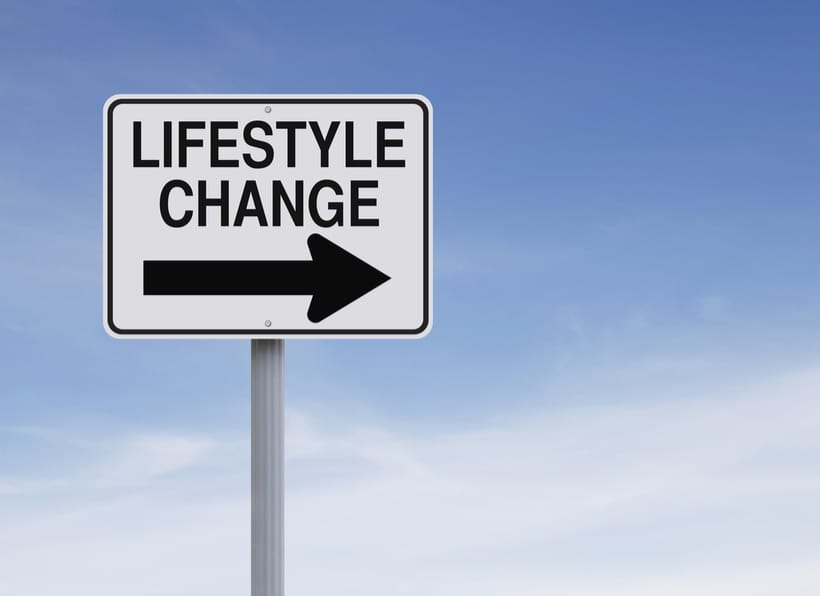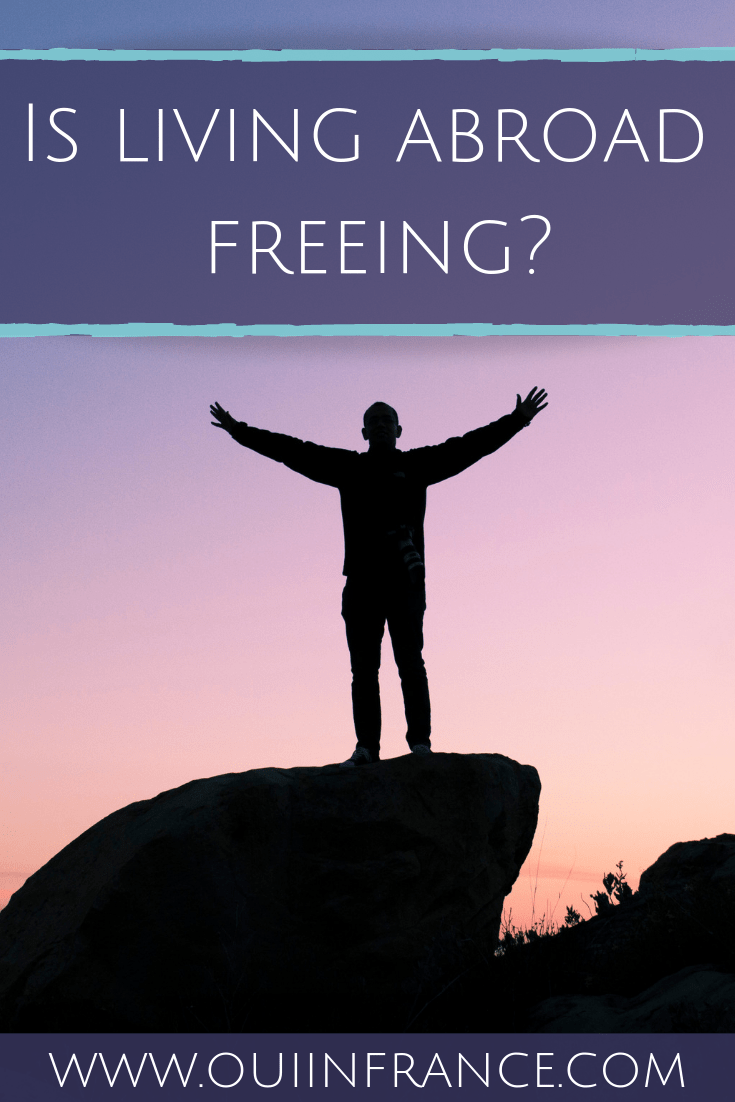A couple of months ago on Twitter, among all of the memes, political arguments and other randomness, I came across a thought-provoking tweet about living abroad. @WeAreXpats tweeted that living abroad can feel freeing and asked if any of us out there felt the same way. It was a question I had never really considered… although I knew the answer.
Here’s the original tweet and my reply:
Yes, freeing in so many ways. I didn’t grow up in France and people don’t really know me here so I don’t feel pressure or expectations to look a certain way or do certain things.
— Oui In France (@OuiInFrance) December 13, 2018

Photo credit (and feature image): Shutterstock.com / Butsaya
I agree that living abroad can feel freeing in a lot of ways and replied to her tweet. It immediately got me thinking deeper about why living abroad is freeing. At the same time, I can see the flip side of every point I write about below and how living abroad can be isolating (as was noted in the tweet). As always, this is just my experience. While living abroad feels freeing for me in a lot of ways, it could be the exact opposite for someone who feels more constrained by their work, life stress, and commitments abroad than they did at home. I’d also like to fully acknowledge you can feel “free” by making a move, or a change for yourself, much closer to home.
But first, for something to be freeing, we have to talk about what we feel free of. Does moving abroad allow us to feel free of judgment, a stagnant career, expectations, our old ways of thinking, and responsibility? What is the opposite of feeling free and how do so many of us get to that boxed in, uninspired place?
Can living abroad be freeing in certain areas of our life and less so in others? Is it freeing for us professionally, creatively, romantically, or spiritually? All of the above?
I don’t have the answers. I want to hear from you. Let the questions marinate a bit…. I certainly did. The tweet was from December! 😉
Anyway…
Here are my top reasons why living abroad is freeing:
You have no history with a place and often a small or non-existent social network, at least when you first arrive. You’re completely unknown. There’s no one who knew you as a kid, teenager or in college. Or at your old job. Or about any of the things you and your family have done, both good and bad.
You get a clean slate to start fresh and present yourself however you’d like with no baggage from the past getting in the way. You can feel like you’re regaining control of your life on your terms.
Fewer obligations. If you don’t have a large network of friends and family abroad, you have fewer things you’re obligated to do. Life becomes more about choice, what you feel like doing, and spontaneity. That sense of not feeling tied down is freeing. You don’t have to show up for anyone except yourself.
I think there’s a healthy balance between doing things for others and prioritizing your own needs, but if you’re like me and have trouble saying no to people, the first bit of time after you move abroad can be really calming when you don’t have anywhere to be or anyone to see. Living abroad has allowed me to do a lot more personal reflection, which is something I never made a ton of time for back in New York City.
Foreigners get a pass. If we stumble, it’s OK because it’s clear from the moment we open our mouths that we weren’t born here and we don’t know everything about a place, culture, or language. There’s no pressure to be perfect when you’re a bit of an outsider.
There are no expectations of what you should or shouldn’t do because most people don’t know your native culture or language inside out and they’re fully aware you don’t know theirs. Cultural faux pas are expected, so I just roll with it when I make a mistake and try to do better next time. I feel less pressure to do things “right” as a foreigner in France. It’s freeing to know you have more leeway when you’re the newcomer.

Photo credit: Shutterstock.com / rnl
Lifestyle change. Many of us move abroad and experience a major lifestyle change in the process. While some people might trade in one high-powered job for another and live the same life just in a different culture — full of the same challenges and stressors — a majority of us trade in a busy life for one that’s slower paced.
What’s inherent in a lifestyle change, at least I hope so, is that life becomes better — easier to manage, with more free time, less stress, etc. or whatever “better” looks like to you. Feeling like you’ve improved your life in some way is incredibly freeing.
In addition, when your whole life becomes different, you’re free of your old routine and all the ways of thinking that come with that. It’s freeing to not feel mentally locked in to what you’ve done for years. Instead, you are forced to try new things. The way you communicate and go about your day is different. You encounter new people and places all around you.
Even now after 7+ years abroad, I can’t help but feel continually inspired by all the ways my life has taken me outside of my comfort zone and into newness. That inspiration sparks creativity and being able to create and have that mental escape is incredibly freeing.
***
What about you? Is living abroad freeing?
PIN IT:






I completely agree with what you say, especially about “fewer obligations” and “foreigners get a pass.” My wife and I were once expats in Switzerland and when we first got there, it helped us realize how over-scheduled socially we had been in the US. Every weekend was packed with get-togethers with friends, some of which we didn’t really want to go to, but we felt an obligation to go anyway. In Switzerland, we were able to manage our time better and kept it up after we got back to the US.
Now we live part of the year in France, where we speak the language and mostly know the “rules.” But we are able to ignore them as we wish, knowing that people will give us a pass because they figure we don’t know what would be expected of a French person. This ability to pick and choose the rules to follow is incredibly freeing! We are what the french call électrons libres, or free electrons. It’s like what we learned back in high school chemistry–sometimes an electron escapes from a molecule and merrily goes its own way. That’s us.
Hi Diane,
I like that you have an analytical mind and recognize the multiple facets of living abroad. You brought up another thought provoking topic.
I wouldn’t say that I have been feeling freer as an immigrant or expat ( I still struggle to figure out which category I belong to). But I have become more open to try something new, to accept that things don’t necessarily must be done only in one way, be more adaptable to change.
Lifestyle change can give one comfort and satisfaction and you are right, living abroad has given me a fresh canvas I could work with and build a new life. I had to take everything from scratch since my successful engineering career of 17 years all of a sudden didn’t mean anything. These days I feel like the Phoenix bird, emerging from my own ashes.
As far as social obligations and constraints, I believe there is a sort of trade off – exchanging a set of social norms from one country to another. Of course, you’ll get a free pass once in a while, however when dealing with authorities and the law, the expectations are the same as for any native.
Living abroad has taught me more about myself, my strengths and what is really at the core of who I am. That feeling of knowing who I am is priceless.
I found it freeing career-wise; while in the US, I had specific expectations of what my salary and title should be. Abroad, it didn’t matter so much, so I did a complete career change (to teaching) and loved it. As for my personality, it follows me everywhere, but I learn new things—some nice, some less-so, about how well I get on with other cultures in tricky situations. I’ve had the most brutal experiences in the UK of all places, with older British women apparently equating my American accent with arrogance, and going out of their way to be hurtful in ways I haven’t experienced since early in high school—and succeeding! Socially, I’m free of extended family duties like exchanging gifts with relatives I barely know, but I do miss them as well.